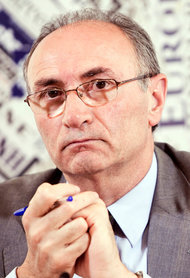Several American and European retailers have sought to minimize any ties they had to factories inside the building, Rana Plaza, while some other companies have been quick to acknowledge their ties to those garment suppliers — and have pledged to contribute to a fund to help families of the victims.
In addition, representatives of two dozen retailers and apparel brands, including Walmart, Gap, HM and Carrefour, met outside Frankfurt on Monday to discuss what can be done to improve factory safety in Bangladesh. Two labor advocates who attended the meeting — which the German government had arranged long before last Wednesday’s factory collapse — said it remained unclear whether those companies would agree to the financial commitments needed to ensure safety at the more than 4,000 garment factories in Bangladesh.
The Children’s Place, a retail chain based in Secaucus, N.J., that operates 1,100 stores, said that although a garment factory inside Rana Plaza had produced apparel for it, “none of our apparel was in production” there “at the time of this terrible tragedy.”
Customs documents show that over the past eight months, the New Wave factory inside Rana Plaza had made more than 120,000 pounds of clothing that had been sent in 21 shipments to the Children’s Place. A two-ton shipment arrived in Savannah, Ga., on April 5.
The Cato Corporation, a retailer of women’s clothing that has more than 1,300 stores in 31 states, also played down any link to the building. In a statement, Cato said New Wave Bottoms, also located there, “was a factory of one of our vendors.”
“However, we did not have any ongoing production at the time of the incident,” the statement said.
New Wave Bottoms has shipped more than 90,000 pounds of apparel to Cato since November, customs documents show, with nine tons arriving at the Port of Charleston in South Carolina in February.
After Bangladeshi labor groups said they had found labels of Benetton clothing in the rubble, Benetton initially denied using any factories in the building. But as more labels and documents showing Benetton orders were found and publicized, the company revised its response, saying it had placed only a one-time order there and had severed ties with that factory.
Ineke Zeldenrust, international coordinator of the Clean Clothes Campaign, an anti-sweatshop group based in Amsterdam, criticized Western companies that sought to distance themselves from the building that collapsed. “It is high time for Benetton to stop this senseless game of always trying to pretend they’re not there,” she said.
Primark, a low-price British retailer, quickly acknowledged that one of its suppliers had occupied the second floor of the eight-story building. Primark has pledged to compensate victims who worked for its supplier and their families, saying compensation would include long-term aid for children who lost parents, financial aid for the injured and payments to the families of the deceased.
“Primark notes the fact that its supplier shared the building with those of other retailers,” the company said. “We are fully aware of our responsibility. We urge these other retailers to come forward and offer assistance.”
Loblaw, a Canadian discount chain, and El Corte Inglés, a prominent Spanish retailer, have also pledged to participate in a compensation fund.
Ms. Zeldenrust called on all Western companies that had obtained garments from the five factories inside Rana Plaza to create a $30 million compensation fund, and praised those that had already agreed to contribute.
On Monday, she attended the meeting that the German Agency for International Cooperation had called to help upgrade factory safety in Bangladesh. Worker advocacy groups are urging Western companies to join a plan — embraced so far by just PVH, the parent company of Tommy Hilfiger and Calvin Klein, and Tchibo, a German retailer — for independent inspections and for the Western companies to underwrite any needed building or fire safety improvements.
“It was a productive meeting, but there was no concrete outcome,” Ms. Zeldenrust said. She added that a deadline was set, and “by May 15, we should know whether there will be a plan.”
Article source: http://www.nytimes.com/2013/05/01/world/asia/retailers-split-on-bangladesh-factory-collapse.html?partner=rss&emc=rss
